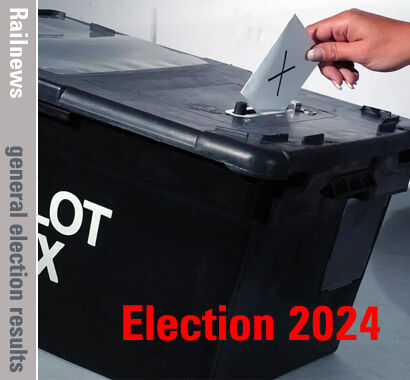Former transport secretaries Mark Harper and Grant Shapps are among the Tory casualties in the General Election.
Rail minister Huw Merriman had already announced his resignation and did not stand in the election.
Labour has won 412 seats, a gain of 211. The Conservatives have 121 seats, which is a loss of 251.
Other Conservative ministers who have also lost their seats include former Prime Minister Liz Truss, Commons leader Penny Mordaunts, justice secretary Alex Chalk and education secretary Gillian Keegan.
When he was transport secretary, Grant Shapps added his name to Keith Williams’ Rail Review in 2021. Before that he had officially abolished passenger franchises in September 2020 in the wake of the Covid pandemic, replacing them with emergency contracts and then National Rail Contracts.
The new government is set to create Great British Railways, which according to a document published in April will be a ‘directing mind’ rather than the ‘guiding mind’ envisaged in the Williams-Shapps Rail Review.
Network Rail will become Great British Railways and take over the operation of the remaining former franchises as they expire, reach a break point or are terminated for poor performance. GBR will also be the general controller of the railways, with only broad decisions about policy and finance remaining with the government.
The King’s Speech on 17 July is expected to include legislation to nationalise the remaining former franchises and create Great British Railways, but the former passenger franchises in Scotland and Wales have already been nationalised, along with four in England. However, Labour has also said that open access operators will continue.
The new shape of the railways has not won universal support in every part of the industry.
The private sector trade body Rail Partners has called for the gains achieved by privatisation to be preserved.
Earlier this week, speaking on the Railnews podcast, Rail Partners chief executive Andy Bagnall said: ‘The franchising system had been creaking before the pandemic. Accountabilities had become blurred. There were less and less bidders for contracts. The benefits had started to be outweighed by fragmentation. So I think everyone agreed the railway needed reform.
‘The Department [for Transport] is now more involved with the railways than it was in the days of British Rail. It is unfair to put some of the challenges the industry is now facing exclusively at the door of the private sector train companies.
‘As they [the Labour government] try and reform the railway, make sure that we preserve some of the strengths of the previous system, that we follow the evidence of what works, and that way we are most likely to be able to address the weaknesses as well.’
The Campaign for Better Transport, meanwhile, said its preferred model was the awarding of operating concessions to private companies. This already happens in some parts of the country, such as on the London Overground and Docklands Light Railway.


